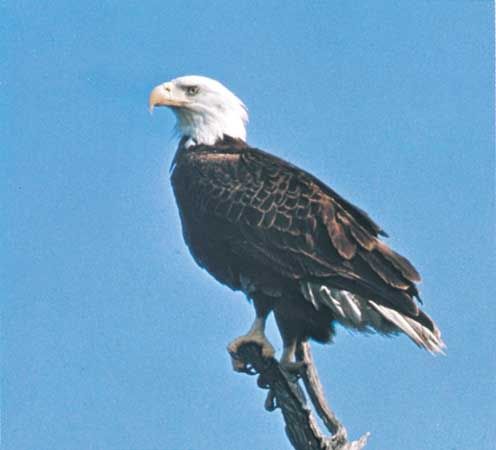Physical Characteristics of Eagles
Taking a closer look at bald eagles gives us a peek into their hunting skills and how they stack up against other bird-of-prey superstars like ospreys.
Wingspan and Size
These eagles spread their wings wide, stretching from 6 to 7 feet, and some downright overachievers even reach up to 7.9 feet. Eagles from the north often take the cake in size compared to their southern cousins.
| Feature | Measurement |
|---|---|
| Wingspan | 6 – 7 feet (200 – 235 cm) |
| Most Impressive Wingspan | 7.9 feet (243 cm) |
Hungry for more details? Hit up our bald eagle wingspan page.
Feet and Talons
Bald eagles have bare, scaled feet that are all about business, equipped with four fierce toes. Now, these aren’t your garden variety toes—each is locked and loaded with a sharp talon. With three toes facing forward and one looking backward, they’re set up perfectly to snag and hold onto prey. This setup doesn’t just look cool; it’s key for their survival as ace hunters.
| Characteristic | Detail |
|---|---|
| Toes | Four |
| Forward-Facing Toes | Three |
| Backward-Facing Toe | One |
| Talons | Sharp and mean as they come |
Eyes and Feather Structure
Adult bald eagles flaunt yellow eyes, unlike the younger crowd sporting darker peepers until they mature. Why the color shift? That’s still a riddle (Journey North).
Feathers aren’t just for show; they play roles from giving these birds lift-off power to keeping them warm. Similar to our nails, feathers, scales, claws, and beaks are keratin-based. They sprout from skin follicles and are held in check by tiny muscles (Journey North).
| Trait | Description |
|---|---|
| Eye Color (Adults) | Yellow |
| Eye Color (Immature) | Dark brown |
| Feather Makeup | Keratin, sprouting from skin |
With all these high-powered features, bald eagles take the top spot as predators. Their sharp talons, eagle-eyed vision, and massive wingspan make them top dogs in the bird world. For more eagle goodness, check out bald eagle facts and bald eagle size.
Hunting and Eating Habits
Getting the lowdown on what bald eagles chow down on and how they score their meals is key to appreciating what makes them tick. Let’s take a closer peek at what makes them tick, and we’ll even throw in a comparison with their rival, the osprey.
Prey Weightlifting
Bald eagles aren’t just good-looking; they’re built like tanks. They can haul prey weighing up to half of their own heft. The ladies, being larger, can lift even more—a girl power win! But if a meal’s too heavy for liftoff, no worries—they’ll swim to shore using their wings as paddles. How’s that for problem-solving?
| Eagle Type | Prey Weightlifting Skills |
|---|---|
| Bald Eagle | Up to half their body weight |
| Osprey | Can do the same, but zeroes in on fish |
How They Hunt
Bald eagles play it cool and strategic. They find a good spot—like a “room with a view,”—where they perch and scour the land for food. It calls for patience, but with super sharp vision, they spot dinner miles away.
Meanwhile, ospreys—also called sea hawks—take the skies by storm. They soar high, using warm air currents for leverage. When they spy a fish, they dive in, talons-first, like true daredevils.
| Hunting Approach | Bald Eagle | Osprey |
|---|---|---|
| Chillin’ On a Perch | Yes | Nope |
| Air Time | Not really | Heck Yes |
| Olympic Diving | Occasionally | Often, and with flair |
What’s on the Menu?
When it comes to dining, bald eagles aren’t picky. Fresh catch is great, but they’ll chow down on a roadkill buffet, too. From fish to small animals to the occasional bird, they’ve got options.
Ospreys, however, are seafood superfans. Fish is their jam—they’re basically the sushi chefs of the raptor world. Sticking to what they know best, they opt for freshly caught cuisine rather than leftovers.
| Bird | Fave Eats | Carrion Connoisseur? |
|---|---|---|
| Bald Eagle | Fish, mammals, birds or whatever’s lying around | Absolutely |
| Osprey | Fish Is Life | Not so much |
Want more tasty tidbits about what bald eagles prefer? Check out our article on their eating habits.
Figuring out these two impressive birds’ gym stats, hunting finesse, and favorite foods shows off their special skills and top roles in nature. For more nitty-gritty insights, dive into articles on bald eagle behavior and how they stack against hawks with bald eagle vs hawk.
Conservation and Recovery Efforts
The story of the bald eagle’s comeback is one of bravery and dedicated teamwork. With a mix of legal protection, tackling harmful chemicals, and strong recovery plans, these majestic birds have a tale worth telling.
Persecution and Protection Acts
Our favorite national bird had a rough ride for years, getting chased down for all the wrong reasons. But, thanks to some quick-thinking folks, laws were passed to give these birds a break. Back in 1966, the Endangered Species Preservation Act stepped in at just the right time. This was especially vital due to the damage caused by DDT and a bunch of other nasty stuff (Avian Report). The act was more than just words; it was a lifeline that turned things around not only for bald eagles but also for their buddies, the osprey.
| Act | Year Passed |
|---|---|
| Endangered Species Preservation Act | 1966 |
Curious if our eagles are still on the danger list? Check out are bald eagles endangered.
Impact of DDT
This pest called DDT was like kryptonite for bald eagles. Between 1945 and 1963, this pesticide was sprinkled everywhere. The downside? It led to eggs with shells as fragile as potato chips. By 1963, the numbers had tanked to a measly 487 pairs in the lower 48 states.
| Year | Bald Eagle Pairs (Lower 48 States) |
|---|---|
| 1945 | Not specified |
| 1963 | 487 |
The damage didn’t just stop with eagles. Other high-flying predators like ospreys and peregrine falcons got hit hard too. But banning DDT in 1972 was a game-changer. Curious about what eagles fill their bellies with? Check out what do bald eagles eat.
Recovery and Delisting
Thanks to some magical conservation wizardry, bald eagles are flying high again. By the time 1999 rolled around, these birds were feeling pretty good about themselves—so much so that they were put up for removal from the Endangered Species Act (Avian Report). They had met their recovery goals fair and square, with plenty of space to stretch their wings.
| Year | Event |
|---|---|
| 1999 | Proposed for delisting from the Endangered Species Act |
| 2007 | Officially delisted |
And in 2007, it was official; bald eagles were off the endangered list! High fives all around for conservation efforts and legal backing in giving these birds a new lease on life.
Interested in more cool bald eagle facts or the whole saga of their comeback? Dive into our other stories and see for yourself!
Contrasting Bald Eagles and Ospreys
Size and Weight
When you stand these feathered fellows side by side, the difference is clear as day. Bald eagles sport a wingspan that spans a grand 6 to 7.5 feet, and they tip the scales at 6.6 to 14 pounds. Meanwhile, ospreys show up with a slightly less impressive wingspan of 5 to 6 feet and weigh in between 3 to 4.5 pounds.
| Bird | Wingspan (feet) | Weight (kg) | Weight (lbs) |
|---|---|---|---|
| Bald Eagle | 6 – 7.5 | 3 – 6.3 | 6.6 – 14 |
| Osprey | 5 – 6 | 1.4 – 2 | 3 – 4.5 |
Nests and Nesting Habits
Bald eagles have a penchant for building massive nests—imagine one as big as a tiny house, sometimes sprawling over 10 feet and weighing a ton. They fancy tall trees near water, way more convenient for snatching their dinner. Curious about their nesting habits? Check out bald eagle nest size.
Ospreys, though, are more inclined towards a practical outlook, setting up their homes on tall structures like dead trees, lamp posts, or even those handy man-made platforms. With the yearly home improvement mindset, they pile up sticks, seaweed, and whatever else Mother Nature throws their way and stick to the same spot every breeding season (Flipper Finders).
| Bird | Nest Location | Nest Materials | Nest Size |
|---|---|---|---|
| Bald Eagle | Tall trees near water | Sticks, branches | > 10 feet in diameter, up to a ton |
| Osprey | Tall structures near water | Sticks, seaweed | Rebuilt annually, varying size |
Hunting and Fishing Strategies
When feeding time calls, bald eagles go for freshly caught critters but won’t shy away from a free meal if still warm. Their strong feet and talons make them masters at grabbing sizeable prey. More on their menu at what do bald eagles eat.
Meanwhile, ospreys are often seen with a fishing rod and a ‘Gone Fishing’ sign—figuratively speaking, of course. They are expert anglers with talons like bear traps. Their reversible outer toe is what sets them apart, making it easier to snag and secure fish. But let’s not give bald eagles all the credit here; ospreys can scavenge with the best of ’em (Flipper Finders)—catch their appetites details on Quora.
| Bird | Main Diet | Hunting Technique | Specialized Features |
|---|---|---|---|
| Bald Eagle | Freshly killed animals, some scavenging | Powerful feet and talons | Strong grip |
| Osprey | Fish, mostly dead | Reversible outer toe for gripping | Specialized talons |
For the inside scoop on their quirks and cuisines, there’s more on bald eagle behavior. Don’t miss out on digging deeper into their antics with our guides like bald eagle vs golden eagle.

